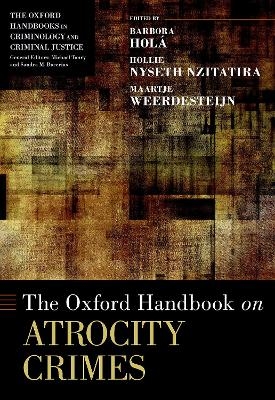
The Oxford Handbook on Atrocity Crimes
Oxford University Press Inc (Verlag)
978-0-19-091562-9 (ISBN)
Social scientific research focusing on mass atrocities, which include widespread or systematic crimes such as genocide, crimes against humanity, and war crimes, expanded after the end of the Cold War. Mass violence in the former Yugoslavia, as well as the genocide in Rwanda, sparked new research initiatives in numerous disciplines. Scholars working in various academic fields such as international (criminal) law, political science, psychology, sociology, history, anthropology, and demography began to focus on the causes and consequences of atrocity crimes. Yet knowledge generated by these various disciplines remains scattered and has not been integrated into a single edited volume.
The Oxford Handbook on Atrocity Crimes surveys and further develops the evolving field of atrocity crimes studies by combining major mono-, inter-, and multi-disciplinary research on atrocity crimes in one comprehensive volume. With contributions of leading scholars, this handbook will be an essential source and reference tool. Unique in its thematic focus (atrocity crimes as an overarching phenomenon, including crimes of genocide, crimes against humanity, and war crimes) as well as in its comprehensive scope, the book covers the etiology, the actors involved, the harm caused, the reactions to atrocity crimes, and in-depth analyses of understudied situations of war crimes, crimes against humanity, and genocide.
Barbora Holá works as Senior Researcher at the NSCR and as Associate Professor at the Department of Criminal Law and Criminology at Vrije Universiteit Amsterdam, the Netherlands. She has an interdisciplinary focus and studies transitional justice after atrocities, in particular (international) criminal trials, sentencing of international crimes, enforcement of international sentences, rehabilitation of war criminals and life after trial at international criminal tribunals. Hollie Nyseth Nzitatira is an Associate Professor of Sociology at The Ohio State University. Her research addresses the causes of genocide and mass violence, as well as how countries rebuild in the aftermath. Her two current projects funded by the U.S. National Science foundation examine Rwanda's gacaca courts and peoples' reentry and reintegration following incarceration for genocide in Rwanda. Maartje Weerdesteijn works as Assistant Professor at the Department of Criminal law and Criminology at Vrije Universiteit Amsterdam. She is an interdisciplinary scholar who focusses on the role of the dictator in orchestrating mass atrocities and the responsibility of the international community to mitigate these crimes.
Introduction: Atrocity Crimes and Atrocity Studies:
Barbora Holá, Hollie Nyseth Nzitatira, and Maartje Weerdesteijn
PART I: Atrocity Crimes
1. Genealogy and Etymology of Atrocity Crimes: Jeremy Kuperberg and John Hagan
2. On the Empirical Study of Atrocity Crimes: Catrien Bijleveld
3. Atrocity Crimes as a Different Type of Crime?: Mark A. Drumbl
PART II: Etiology and Causes of Atrocity Crimes
4. Origins of Predicting Genocide and Politicide: Risk Assessments and Early Warnings: Barbara Harff
5. Human Rights and Atrocities: Melanie O'Brien
6. Armed Conflict and Atrocities: Understanding Power Dynamics: Jolle Demmers
7. Natural Resources and Atrocities: Kieran Mitton
8. Democracies, Dictatorial Regimes, and Atrocities: Maartje Weerdesteijn
9. Ideologies, Identities, and Speech in Atrocities: Jonathan Leader Maynard
10. Meso-level Dynamics of Atrocities: Rachel Jacobs and Scott Straus
11. Detention, Torture, Disappearance: The Crimes of Atrocious Organizations: Susanne Karstedt
PART III: Actors in Atrocity Crimes
12. Individuals as Perpetrators of Atrocity Crimes: Alette Smeulers
13. Individuals as Bystanders to Atrocity Crimes: Roland Moerland
14. On the Margins: Role Shifting in Atrocity Crimes: Erin Jessee
15. Child Soldiers: Myriam Denov and Anaïs Cadieux Van Vliet
16. Non-State Actors and Atrocity Crimes: Ugur Ümit Üngör
17. The Involvement of Corporations in Atrocity Crimes: Wim Huisman, Susanne Karstedt, and Annika van Baar
18. The Role of the State in Atrocity Crimes: Christopher W. Mullins
19. The International Community and Atrocity Crimes: The Responsibility to Protect: Alex J. Bellamy
PART IV: Harm and Victims of Atrocity Crimes
20. Victimology of Atrocity Crimes: Antony Pemberton and Rianne Letschert
21. How Can Mortality due to Atrocity Crimes be Estimated? Methods and Data Sources: Helge Brunborg
22. Atrocity Crimes and Harm to the Environment: Interrelations between Armed Conflict, Violence, and Ecocide: Daan P. van Uhm
23. Forced Migrants and Atrocity Crimes: Victoria Colvin and Phil Orchard
24. In the Aftermath of Atrocities: Research on the Intergenerational Transmission of Trauma and Violence: Lidewyde Berckmoes
PART V: Reactions to Atrocity Crimes
25. Transitional Justice in the 21st Century: History, Effectiveness, and Challenges: David Tolbert and Marcela Prieto Rudolphy
26. International Criminal Justice: Nancy Amoury Combs
27. Sexual Violence as a Practice of War: Implications for the Investigation and Prosecution of Atrocity Crimes: Kim Thuy Seelinger and Elisabeth Jean Wood
28. Amnesties and Truth Commissions: Jeremy Sarkin
29. Customary Responses: Joanna R. Quinn
30. Reparations and the Role of Apologies: Stephanie Wolfe
31. Memory and Memorialization After Atrocities: Nicole Fox
PART VI - Case Studies
A. War Crimes
32. War Crimes in Angola: Joris van Wijk
33. War Crimes, Atrocities, and Resistance in Colombia: Oliver Kaplan
B. Crimes Against Humanity
34. Crimes against Humanity in Indonesia (1965-1966): Jess Melvin and Annie Pohlman
35. Crimes against Humanity and Transitional Justice in Ethiopia (1935-2020): Thijs B. Bouwknegt and Tadesse Simie Metekia
C. Genocide
36. Guatemala: Genocide and its Aftermath: Naomi Roht-Arriaza
37. Genocide Against the Êzidîs in Iraq: The Sinjar Massacre and its Aftermath: Kjell Anderson
| Erscheinungsdatum | 13.03.2022 |
|---|---|
| Reihe/Serie | Oxford Handbooks |
| Verlagsort | New York |
| Sprache | englisch |
| Maße | 241 x 183 mm |
| Gewicht | 1769 g |
| Themenwelt | Geisteswissenschaften ► Geschichte |
| Recht / Steuern ► EU / Internationales Recht | |
| Recht / Steuern ► Strafrecht ► Kriminologie | |
| Recht / Steuern ► Strafrecht ► Strafverfahrensrecht | |
| ISBN-10 | 0-19-091562-5 / 0190915625 |
| ISBN-13 | 978-0-19-091562-9 / 9780190915629 |
| Zustand | Neuware |
| Informationen gemäß Produktsicherheitsverordnung (GPSR) | |
| Haben Sie eine Frage zum Produkt? |
aus dem Bereich


